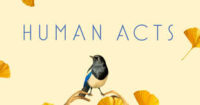Legacy of an Uprising: Human Acts by Han Kang
Written by Kristy Dolson
Ever since I was a teenager, I have considered fiction to be a gateway to events outside my lived experiences. And like many kids who grew up in the pre-cable Canadian countryside, my preferred key to unlocking this gateway was the novel. The novel has tremendous power to create empathy and inspire change. As a timely example, I learned about the May 18 Democratic Uprising when I came to Gwangju. But as an outsider both temporally and culturally, I could only truly understand the significance of this event by stepping through the gateway of fiction. And my key was Human Acts by Han Kang, translated into English by Deborah Smith.
The novel begins in 1980 and progresses to 2013 in a series of vignettes encompassing a range of experiences connected to the May 18 Democratic Uprising and its short- and long-term consequences. Han focuses on a new and seemingly isolated individual in every chapter, writing about their unique and varied experiences, memories, and emotions. Using this approach, she is able to dig deeper into the complex and multi-layered background of the democratization movement. As the stories intersect and overlap, I came to the end of the novel with a much greater understanding of the disturbing whole. And I now have a much deeper appreciation for the survivors of this tragedy.
This novel is illuminating in many ways, but the most striking aspect is where it begins. Han opens her book with the collection of dead bodies. In the immediate aftermath of the May 18 Democratic Uprising, the survivors were faced with the distressing task of retrieving, identifying, and burying the victims. Here lies the idea at the heart of the novel: the broken trust between citizens and their leaders. In Korean culture, the treatment of the dead is observed with great respect and reverence. The government, both in causing these deaths and in hindering proper burials, had fundamentally failed its people. From this betrayal, flowed decades of repressed trauma, oppressive silence, and a steadfast commitment to remembering that failure.
Reading this novel has made me realize why the anniversary of the May 18 Democratic Uprising still matters so much to the city of Gwangju, and to Han Kang, who was born and raised here. She published Human Acts in 2014 as a personal and political response to the 2013 election of Park Geun-hye, the daughter of dictator Park Chung-hee. Han was deeply moved by these election results because she was a child at the time of the May 18 Democratic Uprising and grew up surrounded by the legacy of it. She wanted others to know about that legacy and remind us that humanity is capable of acts both terrible and great. This book is brutal and the reading experience is often uncomfortable. That is the point. This novel instilled in me the horror of a brutal event long past but not forgotten – and far from over.
I consider myself fortunate that the most traumatic experience of my student life was struggling to pass Principles of Mathematics. Han’s novel about the May 18 Democratic Uprising – which began as a student movement – has made me more empathetic towards the May 18 anniversary. And although it is a uniquely Korean story, it has parallels to protests and resistance movements around the world. In the wake of last month’s March for Our Lives protests in the U.S.A., it is disheartening to realize that even now students in democratic countries must demonstrate against corrupt leadership. Fiction is our gateway to emotional engagement with individuals and events beyond our own lives and experiences, but sometimes these stories can have real-world parallels and implications for present-day struggles. Therefore, I maintain hope that these works will bring us closer to a world where people – especially students – are not faced with violent and unnecessary deaths as a result of leaders who can no longer be counted upon to uphold basic human freedom and dignity.
The Author
Kristy Dolson lived in South Korea for five years before taking a year off to travel, read, and spend time with her family in Canada and Australia. She holds a Bachelor of Education and has just returned to Gwangju, where she splits her time between teaching Korean teachers at JETI and reading as much as she can.





